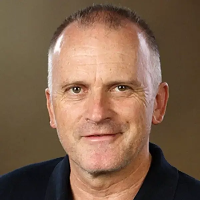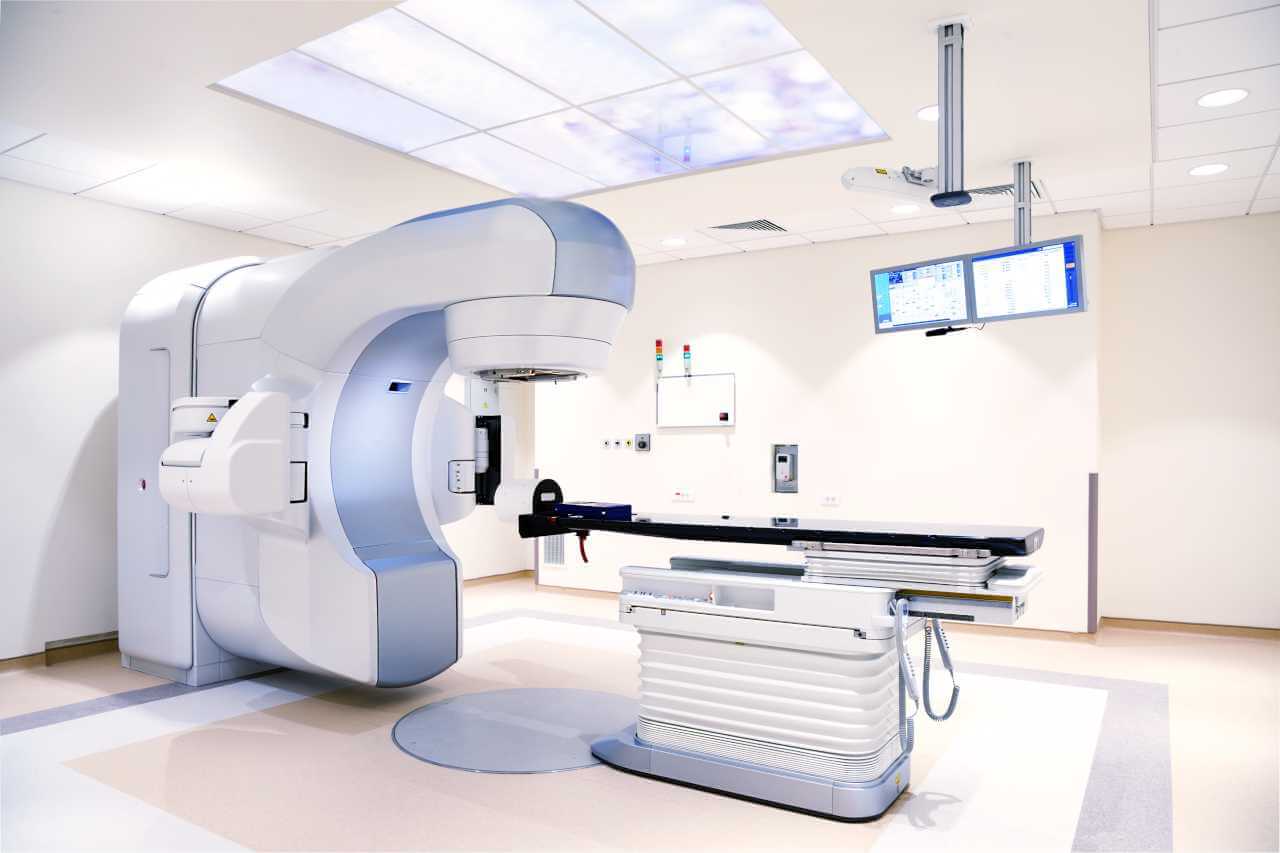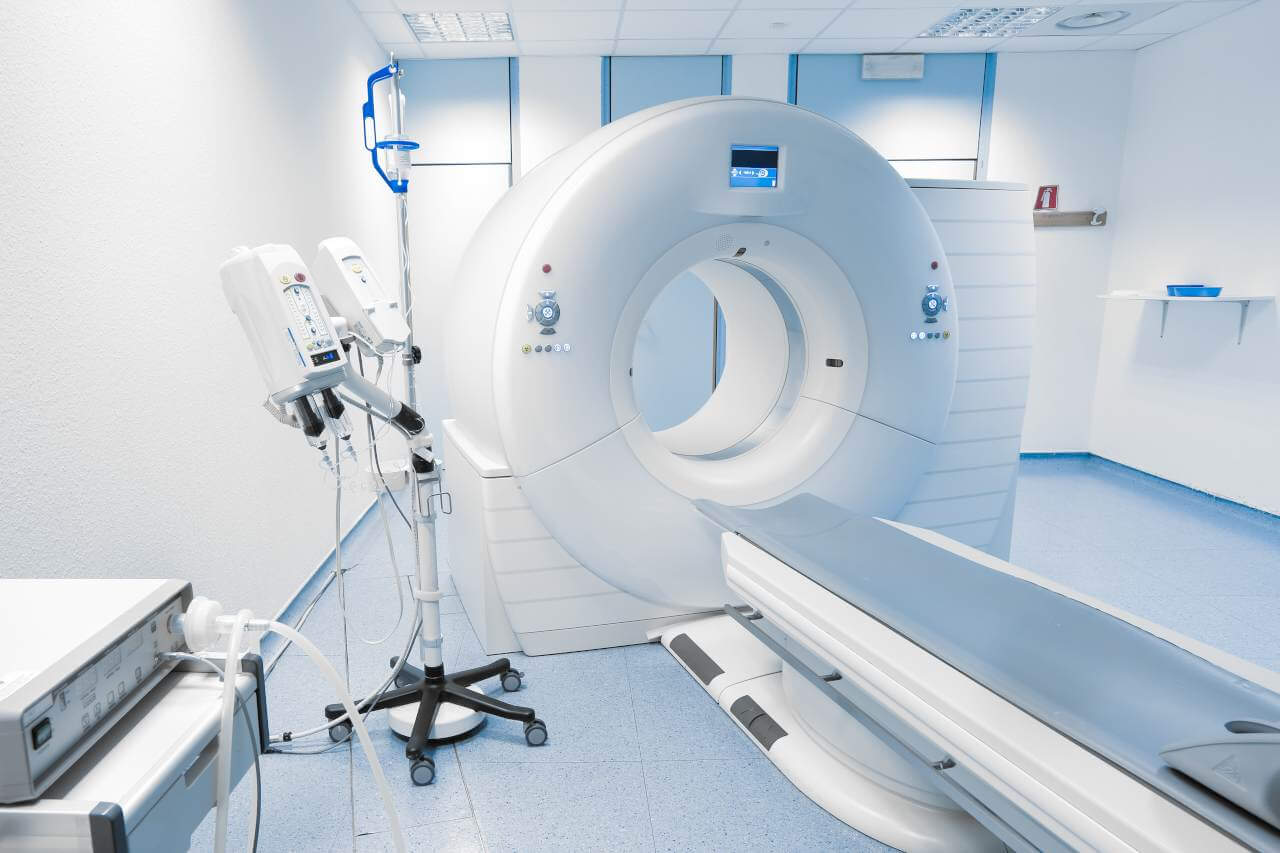
The program includes:
- Initial presentation in the clinic
- clinical history taking
- review of medical records
- physical examination
- laboratory tests:
- complete blood count
- biochemical analysis of blood
- inflammation indicators (CRP, ESR)
- TSH-basal, fT3, fT4
- indicators of blood coagulation
- CT planning of radiation therapy
- full course of conventional radiation therapy
- symptomatic treatment
- cost of essential medicines and materials
- nursing services
- control examinations
- consultations of related specialists
How program is carried out
During the first visit, the doctor will conduct a clinical examination and go through the results of previous laboratory tests and instrumental examinations. After that, you will undergo an additional examination, including complete blood count, laboratory assessment of liver and kidney function. Based on the received results, the physician will conduct radiotherapy planning with the help of CT or MRI, make the permanent tattoo marks on the skin and conduct CT simulation in order to assess the accuracy of the rays and the radiation dose. If necessary, related medical specialists will be involved in the elaboration of a treatment regimen (tumor board).
Radiation therapy is carried out as the day hospital procedure, without mandatory admission to the hospital. At each visit, the physician will assess your general condition and the marks on the skin. After that, you will be placed in a shielded radiation therapy room, on a special table.
Each radiation therapy session lasts less than half an hour (including preparation). All this time, doctors and nurses are monitoring your condition, you can communicate with them through a loudspeaker. The procedure is completely painless. Depending on the planned course of treatment, you will visit the hospital from 1 to 3-5 times a week.
After the completion of the radiation therapy course, you will undergo control examinations aimed at assessing your condition and efficacy of treatment. After that you will receive the medical report with detailed recommendations regarding further follow-up and treatment. In the future, you will be able to have a distant consultation with your attending physician and schedule the next course of treatment, if necessary.
Required documents
- Medical records
- MRI/CT scan (not older than 3 months)
- Biopsy results (if available)
Service
You may also book:
 BookingHealth Price from:
BookingHealth Price from:
About the department
The Department of Radiation Oncology at the Radiation Oncology Clinic Pasing Munich specializes in high-precision irradiation for the treatment of malignant and benign diseases. The primary focus of the department's doctors is on radiation therapy for cancer treatment. The specialists focus on patients with prostate cancer, breast cancer, malignant head and neck tumors, as well as brain, liver, and lung metastases. The team of doctors at the health facility specializes in intensity-modulated radiation therapy (IMRT), image-guided radiation therapy (IGRT), stereotactic radiation therapy, and respiratory gated radiation therapy. The above-mentioned types of irradiation are the most modern and effective treatment methods. Radiation therapy is performed using advanced TrueBeam linear accelerators manufactured by Varian Medical Systems, the world leader in radiation therapy equipment production. The linear accelerators are equipped with an innovative system for cone-beam computed tomography; this CT scanner allows for obtaining high-precision images that facilitate effective irradiation with minimal impact on healthy tissues. The department also has a competent team of naturopaths and dietitians who, upon the patient's request, develop a personalized treatment regimen using complementary medicine methods. With the help of naturopathic procedures, the specialists manage to activate the patient's own forces to fight cancer, improve well-being, and alleviate the side effects of radiation therapy.
The department is headed by Dr. med. Peter Stoll. The specialist has more than 20 years of successful clinical experience in the field of radiation oncology. According to the renowned medical magazine Focus, Dr. med. Stoll is recognized as one of the best radiation therapists in Munich. In addition, the specialist has the highest rating according to the online service Jameda, where patients leave their reviews about the doctors and treatment.
The department's medical team regularly performs intensity-modulated radiation therapy (IMRT). This method allows for optimal distribution of the radiation dose over the tumor while minimizing the impact on surrounding tissues. During IMRT, the irradiation area is divided into many small targets, each receiving separate beams of varying intensity. Thus, specialists have the opportunity to direct high-energy radiation to the tumor focus, which significantly increases the chances of complete tumor destruction. For performing IMRT, the department uses a linear accelerator with an innovative RapidArc system. It is this device that allows for the formation of beams of varying intensities depending on the configuration and location of the tumor with millimeter precision. The RapidArc system rotates around the patient 360 degrees, which makes it possible to target the tumor at different angles without affecting healthy tissues. The use of the RapidArc system also significantly reduces the duration of the irradiation session, so it lasts only 2-3 minutes. The department's doctors most often perform intensity-modulated radiation therapy to treat prostate cancer and head and neck tumors.
The specialists at the medical facility also brilliantly perform image-guided radiation therapy (IGRT). During IGRT, 3D images are generated using the Cone Beam CT scanner integrated into the linear accelerator so that the doctors can control the accuracy of the exposure to irradiation targets. During image-guided radiation therapy, the department's doctors often mark the malignancy with special gold needles a few millimeters in size. These needles serve as markers and ensure high-precision delivery of the radiation to the cancer focus. Thus, image-guided radiation therapy (IGRT) is a high-precision method that allows for targeted irradiation of malignant tumors with high doses of radiation, thereby destroying them without harming healthy tissues. The IGRT technique is ideal for the irradiation of moving tumors, such as lung cancer.
An integral part of the work of the department's radiation therapists is stereotactic radiation therapy. This type of radiation therapy involves a single exposure of the tumor to a high dose of radiation. In most cases, stereotactic radiation therapy is performed in one session, but sometimes fractionated sessions are carried out over several days. The medical facility uses state-of-the-art equipment for stereotactic irradiation, along with auxiliary means for patient positioning. For successful therapy outcomes, it is important for the patient to remain still during the irradiation session. Stereotactic radiation therapy is most commonly used for brain tumors and metastases, especially for destroying neoplasms in hard-to-reach brain areas. In some cases, the specialists at the medical facility also perform stereotactic radiation therapy for patients with small tumors in the lungs and liver, as well as metastases in the lungs, liver, bones, and lymph nodes.
The department's team of doctors is also competent in radiation therapy for the treatment of chronic pain syndromes caused by musculoskeletal disorders. Patients with heel spurs, hip, knee, and shoulder osteoarthritis, thumb arthritis, and other pathologies receive medical care here. The department's specialists irradiate the pathological focus with low doses of radiation. This treatment has proven effective and completely eliminates pain syndrome in patients with chronic pain. The irradiation session lasts a matter of seconds. As a rule, the patient undergoes several irradiation sessions. The procedure is absolutely painless.
The department specializes in radiation therapy for the treatment of the following diseases:
- Malignant diseases
- Prostate cancer
- Breast cancer
- Lung cancer
- Head and neck cancer
- Colon cancer
- Rectal cancer
- Anal cancer
- Stomach cancer
- Esophageal cancer
- Pancreatic cancer
- Liver cancer
- Bile duct cancer
- Thyroid cancer
- Bladder cancer
- Skin cancer
- Testicular cancer
- Cancer of the female reproductive system
- Sarcomas
- Lymphomas
- Brain, liver, lung, bone, and lymph node metastases
- Benign diseases
- Heel spur
- Hip osteoarthritis
- Knee osteoarthritis
- Shoulder osteoarthritis
- Thumb arthritis
- Endocrine ophthalmopathy
- Dupuytren's contracture
- Plantar fibromatosis
- Keloid scars
- Heterotopic ossification
- Other diseases
The department's therapeutic options include the following:
- Radiation therapy
- Intensity-modulated radiation therapy (IMRT)
- Image-guided radiation therapy (IGRT)
- Stereotactic radiation therapy
- Respiratory gated radiation therapy
- Low-dose irradiation for benign diseases
- Naturopathy
- Acupuncture
- Craniosacral therapy
- Microkinesitherapy
- Monolux light therapy
- Vacuum therapy
- Physiotherapy
- Psychological support
- Other medical services
Curriculum vitae
Higher Education and Professional Career
- 1988 - 1995 Medical studies at Heidelberg University; internships in the USA and South Africa.
- 1995 - 1997 Training in Internal Medicine, additional qualification in Naturopathy.
- 1997 Thesis defense, Heidelberg University. Subject: "Development and current advances in the treatment of esophageal cancer with a focus on the results of simultaneous radiochemotherapy at Heidelberg University".
- 1997 - 2001 Professional training in Radiation Therapy, University Hospital Rechts der Isar Munich.
- 2001 - 2003 Professional training in Diagnostic Radiology, Hospital Schwabing Munich.
- 2003 - 2006 Physician at the Muehleninsel Private Practice in Landshut.
- 2006 - 2009 Physician in Private Practice (Radiation Therapist) in Leverkusen.
- 2010 - 2015 Physician in Private Practice (Radiation Therapist) in Rosenheim.
- 2016 Commencement of medical practice at the Radiation Oncology Clinic Pasing Munich.
- 2019 Head and Owner of the Radiation Oncology Clinic Pasing Munich; establishment of RADONC Germany, a consulting company for the construction and operation of medical facilities specializing in radiation therapy.
- 2020 Appointed as Medical Director of the Radiation Therapy and Nuclear Medicine Center in Tbilisi, Georgia.
Scientific and Teaching Activities
- 1997 - 2001 Research Fellow, Technical University of Munich.
- 2015 - 2019 Visiting Lecturer, University of Szeged, Hungary.
Qualifications and Professional Certification
- Board certification in Radiation Oncology.
- Board certification in Diagnostic Radiology.
- Board certification in Internal Medicine.
- Additional qualification in Naturopathy.
- Additional qualification in Brachytherapy.
Clinical Interests
- High-precision irradiation using stereotactic radiation therapy (certified by the Bavarian Medical Association).
- Radiation therapy for prostate cancer.
- Radiation therapy for breast cancer.
- Radiation therapy for head and neck tumors.
Photo of the doctor: (c) Strahlentherapie Pasing München
About hospital
The Radiation Oncology Clinic Pasing Munich is a highly specialized medical facility that provides patients with all types of modern radiation therapy for the treatment of malignant and benign diseases. The primary area of clinical practice is the irradiation of malignant tumors of various localizations. The clinic's work is based on the combination of the very latest scientific achievements in the field of radiation oncology with the use of state-of-the-art equipment.
For carrying out radiation therapy, the clinic uses linear accelerators manufactured by the world-famous American company Varian Medical Systems. Each patient at the clinic receives a comprehensive consultation because it is important for the specialists to thoroughly study the patient's clinical data, tell them in detail about the possible radiation therapy options, and know about the patient's preferences regarding the upcoming treatment. The exceptional professionalism and competence of doctors, combined with state-of-the-art equipment, ensure high-precision irradiation with high success rates.
The clinic successfully performs such types of irradiation as intensity-modulated radiation therapy (IMRT), image-guided radiation therapy (IGRT), stereotactic radiation therapy, and respiratory gated radiation therapy. The clinic's special offer is treatment with complementary methods along with radiation therapy. The aim of such treatment is to activate the patient's own body forces to fight cancer, improve the patient's general health condition, and alleviate the side effects of radiation therapy. An experienced team of naturopaths and dietitians, specializing in oncology, works with patients. The specialists select the optimal set of naturopathic procedures for each patient, including acupuncture, craniosacral therapy, microkinesitherapy, Monolux light therapy, vacuum therapy, and physiotherapy. Treatment with complementary methods is not obligatory and is performed upon the patient's request.
For its outstanding quality of medical service, the Radiation Oncology Clinic Pasing Munich has been awarded the prestigious ISO 9001:2015 certificate, multiple certificates from the German Cancer Society (DKG) for the treatment of cancers of various localizations, and the membership certificate of the Tumor Center Munich (TZM). A strict quality control system has been implemented here, which monitors all internal processes of the medical facility, compliance with radiation protection standards, and the work of physicians and nursing staff. Patients can therefore be absolutely confident in the effectiveness and safety of treatment.
Photo: (с) depositphotos
Accommodation in hospital
Hotel
You may stay at the hotel of your choice during the outpatient program. Our managers will support you for selecting the best option.




